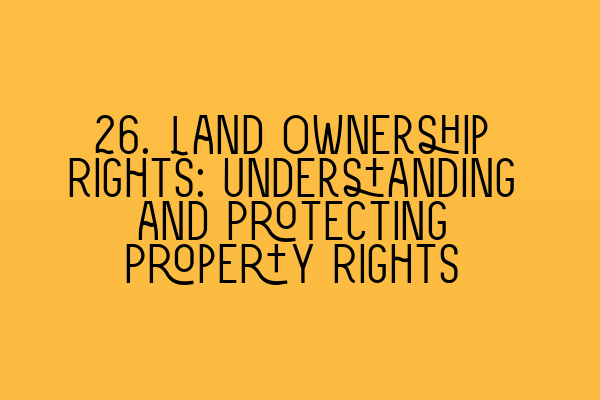26. Land Ownership Rights: Understanding and Protecting Property Rights
When it comes to property law and land law, understanding and protecting land ownership rights is of utmost importance. Whether you are a homeowner, a tenant, or a property investor, having a clear understanding of these rights is essential to navigate the legal landscape of property ownership.
In this article, we will delve into the key aspects of land ownership rights, providing you with valuable insights to safeguard your property interests. From the different types of land ownership to the concept of adverse possession, we will cover it all. So, let’s dive in!
1. Freehold Ownership
Freehold ownership is the most complete form of land ownership. When you own a property as a freeholder, you have absolute ownership rights over both the land and any structures on it. This means that you have the freedom to use, modify, sell, or even pass on the property to your heirs. Embracing your freehold ownership rights ensures long-term security and peace of mind.
2. Leasehold Ownership
Leasehold ownership, on the other hand, grants you the right to occupy and use a property for a fixed period of time, known as the lease term. As a leaseholder, you do not own the land outright but rather hold a lease agreement with the freeholder (landlord). It’s crucial to understand the terms and conditions of your lease, including any restrictions or obligations, to protect your interests as a leaseholder.
3. Adverse Possession
Adverse possession is a concept that allows individuals who have occupied a property for a certain period of time, without the owner’s permission, to claim legal ownership. However, the requirements for adverse possession vary depending on the jurisdiction. It’s important to consult with a property law expert to understand the implications of adverse possession and ensure you are not at risk of losing your property rights.
4. Easements and Covenants
Easements and covenants are legal rights and obligations that can affect your property ownership. Easements grant someone else the right to use a specific part of your land for a specific purpose, such as a right of way. Covenants, on the other hand, are obligations that you and neighboring property owners must comply with, such as maintaining shared walls or common areas. Understanding and protecting your easement and covenant rights is crucial to avoid any disputes or infringements.
5. Boundary Disputes
Boundary disputes can be a common issue between neighboring landowners. These disputes arise when there is uncertainty or disagreement regarding the exact boundaries between properties. Resolving boundary disputes requires careful examination of land registry documents, surveys, and expert opinions. Engaging a property law solicitor can help you navigate through this potentially contentious issue and protect your property rights.
6. Protecting Your Property Rights
To protect your property rights effectively, it is essential to seek professional legal assistance from a qualified property law solicitor. They will offer expert advice, draft watertight contracts, and guide you through the legal processes involved in buying, selling, or leasing a property. Remember, taking proactive steps to protect your property rights is the key to preserving the value and security of your investment.
In conclusion, understanding and protecting land ownership rights is crucial in property law. Whether you own a freehold property or hold a leasehold, being aware of your rights and obligations is essential. Additionally, being mindful of adverse possession, easements, covenants, and boundary disputes can help you navigate potential challenges. Seek the assistance of a property law solicitor to ensure your property rights are safeguarded.
For further information and resources related to property law and preparing for the SQE exams, check out these helpful articles:
– SQE 1 Practice Exam Questions: [link]
– SQE 1 Practice Mocks FLK1 FLK2: [link]
– SQE 2 Preparation Courses: [link]
– SQE 1 Preparation Courses: [link]
– SRA SQE Exam Dates: [link]
Remember, staying informed and prepared is essential to succeed in the complex world of property law and land ownership.
